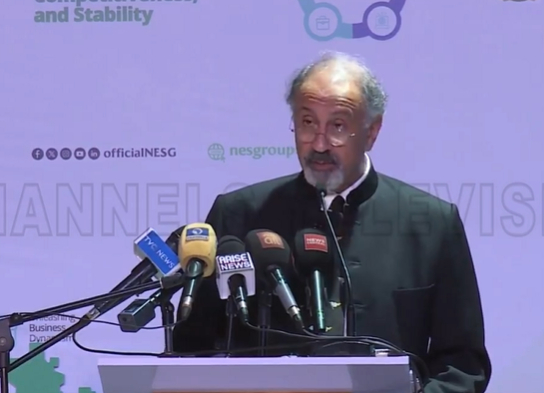Our Terms & Conditions | Our Privacy Policy
Nigeria Needs Obasanjo’s 2003 & 2007 Monetary Reforms to Sustain Economic Growth – World Bank – The News Chronicle
According to the World Bank, Nigeria’s monetary and fiscal policy reforms from 2003 to 2007 are required today to generate and maintain economic development.
Indermit Gill, the vice president of the World Bank Group, said this at the 30th anniversary of the Nigeria Economic Summit, which the NESG hosted.
He claims that Nigeria effectively managed its oil wealth during that time by implementing an oil price fiscal norm, renovating its Paris debt, and letting market forces dictate the exchange rate.
He pointed out that these measures led to a large influx of foreign direct investment (FDI), which raised foreign reserves and spurred economic expansion.
He stated, “let me give you an example of a country that has managed its oil wealth well. This country had oil price fiscal rule that not only insulated the non-oil traded goods sector against oil price volatility but also helped to build a cushion of foreign exchange reserve.”
“It managed its oil wealth with an eye to the future to helping not just the current generation but also future ones. I’m sure all of you here are think he’s talking about Norway- actually I’m referring to Nigeria between the years 2003 and 2007.”
“During those four years, Nigeria implemented fiscal and exchange rate reforms, it introduced unprecedented transparency into the recording and allocation of oil revenues. It renegotiated its Paris Club debt which had created an overhang that was choking the economy and the payoff was immense and immediate. For the first time in history, Nigeria nudged a BB- sovereign credit rating, it started to attract FDI and everyone started to talk of Africa rising.”
“So I’m going to say something unpopular perhaps, but Nigeria’s reforms from 2003 and 2007 were exactly what was needed.”
Additionally, Mr. Gill urged policymakers to continue the current reforms for a minimum of ten years, as the economic benefits will be seen in Nigeria and throughout Africa.
He added that Nigerian policymakers need to take three actions to maintain continuous reforms. These include giving non-oil growth priority, expanding the temporary cash distribution program to 10 million homes to assist disadvantaged households in coping with high inflation, and preparing the economy for business.
He pointed out that the Naira is now more competitive than in the previous 20 years and praised CBN Governor Yemi Cardoso for maintaining the efforts to tighten monetary policy and regulate the foreign currency market.
Like this:
Like Loading…
Related
Images are for reference only.Images and contents gathered automatic from google or 3rd party sources.All rights on the images and contents are with their legal original owners.



Comments are closed.